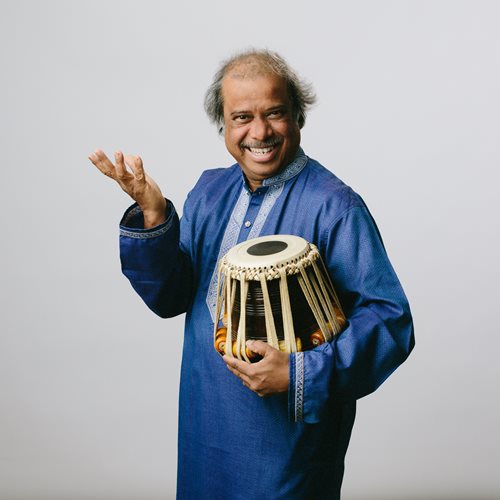 Ritesh Das, founder and artistic director of the Toronto Tabla Ensemble
Ritesh Das, founder and artistic director of the Toronto Tabla Ensemble
We sat down with Ritesh Das, founder and artistic director of the Toronto Tabla Ensemble, to learn more about his journey and work.
How does it feel to be nominated for the Celebration of Cultural Life Award?
There are so many different kinds of feelings. First of all, I am honored. Second, it makes you feel like “wow!” Working in the city for such a long time - it makes you feel like “finally, it’s great to be the recognized for your work and what you do.”
Going back to 2016 when you won the Toronto Arts Foundation Roy Thomson Hall Award of Recognition, what was the impact of winning that award?
I met a lot of people. Emerging artists and you all here [at the Foundation]. We also met photographer Sean Howard. Just a whole lot of doors that opened that helped the organization quite a bit. Any award you get helps to solidify you to do more work for the next generation. In that way, it is very helpful. What I would love to do which has not happened yet, is if some day, the people who won the Roy Thomson Award – that [we all] could do some work at Roy Thomson Hall together.
So what's next for the Ensemble and the School?
What's next for the Ensemble is the Toronto Tabla Youth Ensemble, I’m heavily focused on the youth right now. The kind of work I'm doing with the youth right now I would boldly say hasn't been done in the world yet. 9-10 year old kids taking the roots of the North Indian rhythm system and composing their own work. Performing in a situation which is similar to an Ensemble, but also taking the aspect of the roots of North India and transcribing that. I can't say I have seen anything like that. What we've been doing is getting a huge amount of recognition from India. So what’s next for us and the Ensemble is the youth, the next generation. It’s important because eventually, the youth will go to the main Ensemble. I'm very much focused into what shapes [the youths’] identity or who they are in the future for their self-confidence. Ultimately, we're trying to build an ecosystem.
The next album,“Bhumika,” is a dedication and honour to my brother who passed away. He was a great dancer, a legend. I've learned so much from him. I think it’s the best album I’ve ever created and composed. The release is June 9th, my birthday. There are Indian musicians involved, Kiyoshi from Nagata Shachu is involved. We composed a piece in 5 and a half beats, which is unheard of - that is never ever done in Taiko. So there are a lot of firsts happening.
What keeps you going, what keeps you inspired?
It is the music. It's yoga, its meditation. Through practice, it shows your way about life. It shows you about life, composing, psychology. It shows excitement, sadness, everything. So, if you meditate like that, that is a tool for life. It's the food for your soul, the excitement of living, breathing and doing in this world. It makes you feel good. There are different aspects of inspiration. What keeps me going is the very fact that makes me live.
How do you think the Tabla Ensemble has impacted music in Toronto?
It has exposed a lot of people to the form who don’t know about the music. One of things the Tabla Ensemble did and is still doing is collaboration. So for example, we have collaborated with Nagata Shachu, a Japanese Taiko drumming group. In a performance with them, you might have a Japanese crowd, or an Indian crowd or maybe a mixed crowd of both! You are exposing the culture in that way to both the genres, and you also learn about the culture. The Tabla Ensemble has been incredibly responsible for bringing a lot of people together. Tabla is a very sophisticated instrument. Toronto is the best place to do it. We have the whole world living here - it is beautiful.
How is your life a celebration through the arts?
This is part of that celebration. I've been celebrating through all my work: from my teaching, my work, my Ensemble, my composing, through living.